Peter MALONE
Saturday, 18 September 2021 19:45
Bloodline
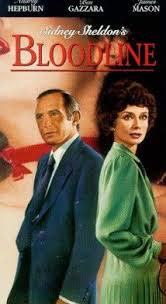
BLOODLINE
US, 1979, 111 minutes, Colour.
Audrey Hepburn, Ben Gazzara, James Mason, Irene Papas, Romy Schneider, Omar Sharif.
Directed by Terence Young.
Years earlier, Terence Young directed a terrified Audrey Hepburn in Wait Until Dark. He has her terrified again here as she presides over a multi-national pharmaceutical company, whose board consists of cousins all capable of murder - a multi-starred group including James Mason, Romy Schneider, Omar Sharif (and all, including heroine, looking regrettably older). Gert Frobe, as a scruffy inspector enjoying detection by computer, is excellent. But the stars, international settings, Ennio Morricone's very-varied score and intrigue keep us guessing and overlook the fact that the screenplay is extremely formula material and that red herrings, tricks abound and motivation is scarcely explained. But this is the staple material of the movies.
1. The appeal of this kind of multi-starred glamorous murder mystery? The perennial appeal of big business, human conflict? Violence? Sexuality? The ingredients dressed up in '70s style?
2. The multi-starred cast and their various styles? The use of American and European locations? Glamour, wealth, clothes and decor? The contribution of the score and its variety of tones e.g. during the inspection of the factory, the score for Audrey Hepburn?
3. Audience response to the world of multi-nationals and their aura, power and intrigue, violence, greed, crime, perversion? How real is the world of this kind of best-selling film?
4. The building up of the private firm by Sam Roffe? The opening of the film with his death and its repercussions? The strength of Roffe, his diary and the importance of the flashbacks? The visualising of his origins, humble beginnings, Poland and his experiments, his success with his father-in-law? Elizabeth and Kate visiting Cracow? The dramatic insertion of the flashbacks in Elizabeth's mind? Sentiment and feeling for the firm and her holding on to it?
5. The credits and the red ribbon for a bloodline, the model? The later taking up of this for the pornographic films, the murders? The connection of glamour and lust with Sir Alec and his young wife and her gambling, her torture? The perverted tone - the perversion as shown and the motives for the killings?
6. The repercussions of Sam Roffe's death, the advice to go public, the various business deals, the attitudes of the banks - and their being persuaded by Elizabeth, sabotage? The need for money as the motive?
7. How satisfying a murder mystery? The threats to Elizabeth? Was the screenplay fair with giving clues, the possibilities for each of the suspects to do the murders? The red herrings, the trick suggestions, the standard manoeuvres for murder mysteries? The end with Elizabeth having to choose? How satisfying was the range of suspects and playing detective with Inspector Hornung?
8. Inspector Hornung and his personality, scruffiness, the scenes where he discussed with the computers and his joy in working with the computers? His skill in investigation? His having to see the pornographic movie and his comments on it? His presence at the end and saving Elizabeth? A strong characterisation?
9. Audrey Hepburn as Elizabeth? Her presence, beauty, age? Seeing her at work at the start, the music to introduce her, the glamorous focus on Audrey Hepburn? Her background, relationship with her father and love for him, her glamour? Her friendship with Rhys? The board meetings after the walk in the park? Her persuading the cousins of her own views? The clash with the cousins? Her reading of the diary and the visit to Cracow and its impact on her and her feelings? Her decisions? Kate and her support? The visit to Sardinia and the bond between the two women, the threat on her life with the failing brakes, her being in hospital? Coping with the threat. dealing with the banks, the promise of the pill to delay old age? Her decision to marry for the good of the firm? The hearing of the tape and its later disappearance? The build up of her fears? The impact of Kate’s death and her narrow escape? The marriage and her happiness in it, the visit to Paris and her suspicions of Rhys, the clash in the restaurant? The discovery of the tape in his drawer, her fleeing from him, the final choice and acting against Rhys? The happy ending - for herself, for Rhys, the business? A strong performance to sustain the best-seller aspects of the film?
10. Rhys and his businesslike attitudes at the start, discussions in America, his not being part of the family, his observations at the board meetings, his relationship with Sam and his rise in the firm through him? His marrying Elizabeth and yet having an affair with Helene? Audience suspicions of him, Inspector Hornung's suspicions, the growing evidence against him? The restaurant scene with the girls, the discussion with Elizabeth in the street? The menace at the end and her not choosing him when she should have? The future running of the firm with them both?
11. The build up of the cousins - the information given about them, the introductions to them and the information about Sam Roffe's death? Editing in the episodes about them to the whole film? Hornung's comments and the information from the computer and the way these were visualised? Their presence at board meetings? The red herrings to suggest that each was capable of murder?
12. Sir Alec and his gambling, political background and his references to it, his devotion to his young wife, her gambling debts, the criminals and their threats, his fears and the need to raise money, his denial of being able to traffic in morphine, the relationship with his wife, her torture, his presence at the board meetings and protectiveness towards Elizabeth? James Mason's suave style? Was he a credible killer, murdering the scientist, setting the factory on fire, the pornographic movies? His presence at the end and his threat to Elizabeth?
13. Helene and Charles and their French attitudes? Helene's strength and her driving the racing car, her dominance of Charles, his speculation in vineyards etc? Their business acumen, Charles and his debts, his stealing his wife's jewellery? His being blackmailed by Rhys with Elizabeth present? Rhus and his affair with Helene? Charles robbing Helene and leaving? Helene's plots - a credible killer?
14. Ivo and Omar Sharif's style? His relationship with Donatela and the three boys? The return to Simonetta and the three girls? The humour of their names being the same? His need for money, his background of violence, his marrying into money? His fawning attitudes at the meetings? The Tivoli Gardens sequence and the various threats by Donatela?
15. Kate as efficient secretary, companion to Elizabeth? Her death?
16. The insertion of the murders of the prostitutes and the pornographic film? Their purpose, the credibility of Sir Alec's commissioning them?
17. The background of computers and the detection by computer?
18. Old fashioned affluent melodramatic murder mystery - and its continued appeal?
Published in Movie Reviews
Published in
Movie Reviews
Tagged under
Saturday, 18 September 2021 19:44
Blood Money / 1933
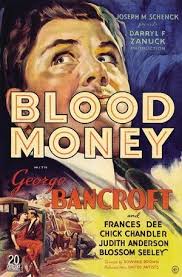
BLOOD MONEY
US, 1933, 66 minutes, Black and White.
George Bancroft, Judith Anderson, Frances Dee.
Directed by Rowland Brown.
Blood Money is an entertaining, offbeat gangster film of the early '30s. it was written and directed by Roland Brown (Quick Millions, Hell's Highway). While it echoes the violence of the gang wars and political corruption in the American cities of the early '30s, it focuses on Bailey, a bail bondsman played genially by George Bancroft. Frances Dee has an unusual role as a spoilt society girl. She is contrasted with Judith Anderson in an early film role as the nightclub owner Ruby. While the material seems stock, as do the characters, Brown invests them with a liveliness and a tongue-in-cheek humour that makes this film above average of its kind.
1. The popularity of gangster films in the '30s? The comparison between this and the better known films?
2. Black and white photography, the Alfred Newman score, George Bancroft and his personality, Francis Dee and her ingenuous style, Judith Anderson and her strength?
3. The background of American crime, gangs, politics and high society? The satirical tone of the film? American larrikin style, tongue-in-cheek? The film's moral stances and criticism?
4. The portrait of Bailey: George Bancroft's amiable style? Bailey and his self-confidence, his character, his being called at night by those in need, his playing pool? his assistants? His self-promoting cigars? Songs? his love for Ruby? The bond between the two? His friendship with Drury and helping him? The motive for helping him? The encounter with Elaine, falling in love with her, helping her with the bond, going to her home, the party, taking her to the greyhound races, meeting her father? Drury and Elaine's attraction for him? her keeping the money and its repercussions for Bailey? His being betrayed? The press, bankruptcy? Ruby and her attack on him? The gangsters? The explosives in the 8-ball? his discovery of the truth, saved by Ruby, disillusioned with Elaine? The portrait of a bail bondsman?
5. Ruby as the tough woman, her clubs, devotion to her brother, love for Bailey, jealousy? Attitude towards Elaine? The gang fights and her instigation? Her discovery about the explosive and her saying Bailey?
6. The contrast with Elaine - shoplifting, calling herself Jane Smith, the Talbot family and their wealth, background? Spoilt brat? The motives for her shoplifting? The encounter with Bailey, the phone calls, the interviews? At home, her father, the party? At the races and her enthusiasm for the greyhound - till it lost? Her being attracted by Drury and his reputation? Taking the money? Betraying Bailey? The end - and her going on an interview for more dangerous encounters?
7. Drury, the robberies, the infatuation with Elaine?
8. The world of the gangsters, types, violence, gang wars?
9. The comic touches with Bailey and his assistants?
10. Character-drawing in the context of the gangster film? Larger than life? The blend of the humorous and serious?
Published in Movie Reviews
Published in
Movie Reviews
Tagged under
Saturday, 18 September 2021 19:44
Boat is Full, The
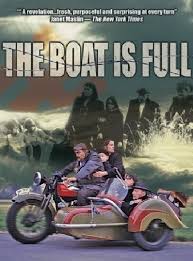
THE BOAT IS FULL
Switzerland, 1981, 100 minutes, Colour.
Tina Engel, Kurt Bois.
Directed by Marcus Imhoof.
The Boat Is Full is a striking Swiss film, the first made by its writer director Marcus Imhoof. The material is familiar, but the treatment is sound, impressive and moving. It is another portrait of a group of refugees, however their dangerous escape has bought them into Switzerland with the problems about their remaining in the country. They are suspiciously but well received by the people of the village, asked to go back by the authorities and finally sent back. The final captions, as might be expected, indicates the tragic deaths of those involved.
As a portrait of a group of Jewish refugees, the film is low key, compassionate, and moving. As a glimpse of the Swiss response to the war situation the film is vivid and ultimately condemnatory. It seems, in some way, to be an examination of conscience, of Swiss attitudes of neutrality. Distancing the action to a period when conscience was important, the film implies questions for Switzerland in the 80's . The acting is excellent, the atmosphere well communicated, the tension very strong. This the kind of film that could well be seen by a universal audience. It is also an interesting example of the potential of Swiss filmmakers.
1. The title of the film and its meaning? Accident, survival? Impact on people wanting to survive? The film's Oscar nomination? Awards? especially for humanity? Entertainment, interest? History, conscience? Relevance today?
2. The quality of the production? A first film by the director? His skill? Quality? Compassion?
3. Colour photography, Switzerland in the '40s, the village, the escape from German occupied countries? The countryside, atmosphere? Editing and pace? The use of locations, the town, the way of life? The re-creation of the war period?
4. The opening with the drama of the tunnel, the train, the dramatics of the escape, the expectations of the characters? Expectations of the audience? The escapees, the risks, the train stop, dangers, the soldier helping and joining them? The introduction to risk? The experience of the refugee group in the village and their suffering, going on? The epilogue with the sad information about what happened to each?
5. Anni and her husband: the encounter with the refugees, never having seen them, ordinary Swiss folk, their reactions, suspicion? Generosity, caution? The welcome, the food? Washing and the lice? The decision to conceal? The advice of the minister? The plans? France and anti-Semitism? The change in their way of life? The detail of the hospitality scenes - the long eating scene, reflections? The role of the police - doing their duty, the letter of the law? The law and exceptions? A Swiss view of the situation? The severity, the fear? The contrast of the ordinary day of the Swiss during the war with the experience of the refugees? The farm, the customers in the restaurant? The inn and its food, shelter? Judith and the phone calls? The old man and the pork? The boy and the bath? The decision to change identities and keeping the boy quiet? Healing wounds?
6. The focus on Judith: her strength, her command of the situation? Her desperation for the phone call? Talking to Hanez? The plan? Her humane understanding of each? The phone and the revelation, sitting on the ground, Bigler? The escape? The jail and Hanez? The pathos of the ending? A vivid portrait of a woman?
7. Hanez, the jail, the phone call, the escape and his being covered, the bike, the riding, being caught, reunited with Judith?
8. The shooting, Schneider, the old man and his Jewish background, the children, especially the French boy? Their fates?
9. The minister and his help? Religious concern and the transcending of denominations?
10. Bigler, the police and their attitudes, jail?
11. The film's attention to detail? The portrait of the neighbours, their curiosity, the help?
12. The group and their fears, their backgrounds, their having to change identities, the tension in keeping their disguises, their being tested by the police, the finding out of the truth, their being moved along ?the Swiss boat being full?
13. The emotional experience of the film: sense of humanity, loss, suffering, death, refugees and exile, pain, hope and hopelessness? The range of men and women, age groups, religions, nationalities? The title and its theme: refugees and their need, the comment on Swiss neutrality, the criticism of the law, selfishness? The epilogue and the audience being left with the tragic information?
Published in Movie Reviews
Published in
Movie Reviews
Tagged under
Saturday, 18 September 2021 19:44
Bobby Deerfield
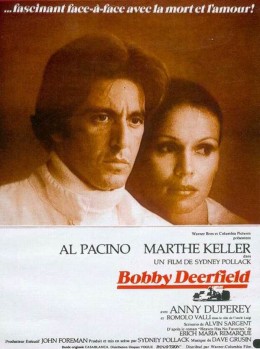
BOBBY DEERFIELD
US, 1977, 123 minutes, Colour.
Al Pacino, Marthe Keller, Anny Duperey, Walter Mc Ginn.
Directed by Sidney Pollack.
Bobby Deerfield has all the ingredients for commercial success, the love story formula (the ages of the couple advanced to thirtyish), the world of car racing, the Continent (Paris, Switzerland, Largo Maggiore and especially Florence), an American alienated from home and family, wealth and fashion, Al Pacino, Marthe Keller, Sidney Pollack (The Way We Were, Condor) and Alvin Sargent (Love and Pain, Paper Moon). The ingredients mesh well and popularly for their purpose ? the widest appeal for male and female audiences together. What makes it better are contrived, but well acted and even moving sequences like those with the magician or Bobby and Lilian being photographed by the American tourists. Pleasing entertainment with a subtle performance by Al Pacino.
1. The appeal of this romantic story? For what audience? For men, for women? A 70s audience? The novel on which the story was based, by author Erich Maria Remarque and its title, Heaven Has No Favourites?
2. The film's style: colour, Panavision, European location photography, the world of motor racing, fashion, wealth? The stars and their glamour?
3. The racing car setting? Speed, power, the individual driver and his achievement, popularity and crowds? The preparations and skill, nerve? The speed, motion? The excitement of pit stops and competitiveness? The danger of accidents and the way these were visualised, stunt work? The introduction to Bobby Deerfield within this context, his concern for success, excellence? A masculine world of achievement? The modern hero and celebrity? Audience interest in racing cars, competitiveness, the rallies, style?
4. Bobby Deerfield as a personality, as a character? The skill in Al Pacino's performance, his obsessive nature, desire to win, stiffness in manner, his subservience to his image of himself and its being changed? The background of the circuit world? His being on the move, glamour, advertising, wealth? The fact that he was an American in Europe and the effect of Europe on him?
5. The dramatics of the accident, his attention to it, rerunning the film, examining the cars? The fact that the same thing could happen to him? The later accident and its effect on him?
6. His relationship with Lydia? Her presence at the rallies, her glamour, her love for Bobby, the exchange of gifts? A cool woman in this world? Her attitude to his deceiving her, her checking out Lillan? The fragility of their relationship? Lydia within the background of the racing car drivers' wives, their presence at the rallies etc.?
7. The character of Leonard, his visit to Bobby, the revelations about the family? How well did the film fill in the detail of the Deerfield family, Bobby's place in it, the absence of the father, love for the mother? Leonard's bitter words during the meal? The photos? The importance at the end with Lilian and the tourist's photograph and his giving his name as Robert Deerfield and his American address? How well did the film highlight thews of family and family relationships?
8. The importance of Bobby's going to visit the driver and the sanatorium? The long drive there and back and the contrast with his being by himself reflecting and the return with Lilian? The discussion with the driver ? the reasons for it, what was Bobby trying to find out? The friendship and yet the hostility of the driver? How well did this illustrate Bobby's character and his motives?
9. The introduction to Lilian and the audience knowing that she was in the sanatorium? Wondering about her illness? Her wilful nature, her joy in life and yet her knowledge of her illness? The meal and her communicating with Bobby, borrowing things from him? Beginning to talk, communicate? The importance of the sequence with the magician and its mood, music, the symbol of the magician and appearances and reality?
10. Bobby's talk with the magician in the cafe? The nature of tricks, illusions? The later return to the sanatorium and the presence of the magician?
11. Bobby's mood and attitude as he was leaving, Lillian’s decision to run away? The return journey down the mountain by car, train? The discussions, clashes? Bobby unable to understand her, her wanting to scream? The sequence at Lago Maggiore? The decisions about their relationship, sexuality? The falling asleep? Her hair falling out? Lillian’s impulsiveness and Bobby's inability to cope with this?
12. The significance of their conversations and their revelation of each other, or their hiding their characters? Lilian and her focus on moods, risks, enjoyment? Bobby and his being sober, living up to his image? The return to Florence and Bobby's continued fascination with Lillan?
13. Bobby's return to Paris, his deception of Lydia, his work with the advertising, his search for the faults in the car, his accident and the repercussions? His visits to Florence, his running and discussion with the friar at Florence? The picnic, the discussion with the owner of the property, the balloons and Lillian’s going in the balloon and his inability to do this, his anger? The discussions with Uncle Luigi, the card games? The walk in the street and Lillian’s daring him to be recognised and her shouting out who he was? The importance of her telling stories and making them up and his inability to do this? The breakthrough when they were on the river and he made up the story and she believed it? How did they affect each other? Bobby and his wanting to make commitment. Lillan and her inability to make commitment? The influence of her imminent death?
14. How sympathetic a character was Lilian, how well could the audience understand her, see her through her own eyes, through Bobby's? The importance of her illness and her wanting to enjoy life? Her times by herself and her facing herself? Her keeping the secret? Lydia's giving it away and the effect on Bobby?
15. Their meeting again, communication, friendship, love, sexuality? Her decision to return to die? The trip back, the photo with the tourists and the use of the photo at the end? Her telling the truth about herself?
16. How effective the death sequence? Romantic? Tearful? Authentic? The communication between the two, genuine feeling in both? The sadness of the terminating of the relationship?
17. The film as a romance of the 70s, the Love Story decade? A real world or a world of fantasy, glamour? The themes of love, human relationship, self-expression, freedom and liberation, the humanising of people by relationships, risks? The universal appeal of this kind of material?
Published in Movie Reviews
Published in
Movie Reviews
Tagged under
Saturday, 18 September 2021 19:44
Boccaccio 70
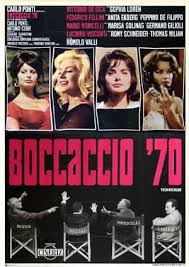
BOCCACCIO 70
1962, Italy, 158 minutes, Colour.
Sophia Loren, Romy Schneider, Anita Ekberg, Peppino de Filippo, Tomas Milian.
Act 1. The Raffle, directed by Vittorio de Sica.
Act 2. The Job, directed by Lucchino Visconti.
Act 3. The Temptation of Dr. Antonio, directed by Federico Fellini.
Boccaccio 70 is one of those omnibus films popular in Italy in the 60s. It was meant to be a showcase for the stars involved and to be provocative with these stars in contemporary Boccaccio-like stories. However, producer Carlo Ponti has three of Italy's best directors involved and those interested in the work of these men will want to see the film.
The stories are tongue in cheek love stories, not meant to be taken too literally, but certainly meant to be a picture and criticism of the Italian social scene. To that extent, non-Italian audiences looking for a 'sexy show' will be disappointed and probably find the film dull and uninteresting. However, the purpose of including the film in this series is to provide some questions on Act 3, The Temptation of Dr. Antonio, an interesting short film by Fellini (it is the 1/2 of 8 1/2), satirising the righteous indignation and crusades of Legions for Decency. It is more varied in style than the previous stories. Obviously Boccaccio 70 is not for every audience, but selected groups might profit from discussing the themes of the Fellini story.
1. Act 1, The Raffle: a comic-realistic look at Italian men's moral attitudes. The heroine, an attendant at a carnival shooting gallery, is raffled to make money to pay taxes. Comically crude and showing inconsistencies of the Italian-religious-amoral attitudes, this story by De Sica and his regular writer, Zavattini is clearly meant to be the popular part of the film.
2. Act 2, The Job, is more highbrow and rather difficult to understand for non-Italian audiences. Directed by Lucchino Visconti, it is a glimpse of fashionable Milanese life and morals where a rich wife, exasperated at her young husband's affairs with callgirls, manoeuvres him into paying her the equivalent of a callgirl. As with Visconti's work, there is emphasis on the scene for atmosphere and the faces and mannerisms of the protagonists. Audiences will be puzzled by it and not really gripped, although there is a good performance by Romy Schneider who, for much of the time, is filmed in close up and on the phone.
3. Act 3, The Temptation of Dr. Antonio:
1. What is the point of this episode - in view of the fact that it is narrated by a little girl who pokes out her tongue at the audience at the end?
2. How much of the episode is effective satire and how much caricature?
3. What does the film convey about Dr. Antonio's personality? the incidents at the beginning e.g. at the theatre, the bookstall;
his reaction to the putting up of the bill board;
his religiosity;
his appeals to civil and church authorities;
his obsession with the billboard, continually looking at it?
4. Is his attitude of keeping public moral order a healthy attitude? Did he do the job in a balanced way?
5. Did the billboard have the effect on the Roman people that he said it did? Did it impress you as an immoral advertisement?
6. What was the point of his fantasy when Anita Ekberg came alive?
7. Why was he afraid of her? Why was he obsessed?
8. How did this episode compare with the others in the film as regards, interest and entertainment; cinema styles and photography?
9. (If you are familiar with Fellini's films you my care to discuss what the film communicates concerning Fellini’s continuing concerns: his attitude towards life and morals; a man's mind and obsessions, especially sexual; the influence and hypocrisy of religion; Roman life and attitudes.)
Published in Movie Reviews
Published in
Movie Reviews
Tagged under
Saturday, 18 September 2021 19:44
Body Double
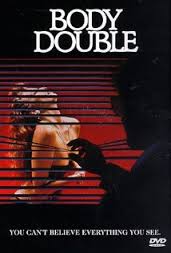
BODY DOUBLE
US, 1984, 109 minutes, Colour.
Melanie Griffiths, Craig Wasson, Gregg Henry.
Directed by Brian de Palma.
Body Double is another of Brian de Palma's homages to Alfred Hitchcock. With Sisters, Dressed to Kill, Blow Out, Obsession, de Palma imitated Hitchcock's films, most especially Vertigo with aspects of Psycho, Spellbound and Rear Window. Vertigo and Rear Window are very strong emphases here, along with a Dial M For Murder kind of murder and touches of Psycho. However, this film goes over the top. it would seem that de Palma has to be joking. The film almost veers into parody. However, despite the absurdity of the plot and characters, de Palma uses all his technical flourishes to emotionally involve his audience.
De Palma is also very strong on the reality/fantasy aspects of filmmaking. he sets his plot initially in a B-grade Dracula film and then moves it to the world of pornographic films. In the meantime he uses Rear Window and Vertigo in reverse and also draws out many of the sexual and violent implications in Hitchcock's films.
The film will certainly not be to everyone's taste as they are invited to share the voyeurism, the lusts, the snooping curiosity of the hero who does not suffer from vertigo but a kind of claustrophobia which has visual comparisons with James Stewart's vertigo.
A cinema eccentric curiosity.
1. Interest in the work of Brian de Palma? The body of his work? Thrillers, gory murders? Criticisms of his going over the top, excessive sequences of horror? His being influenced by Hitchcock, knowledge of Hitchcock's films, imitation, homage?
2. The film as an enjoyable exercise in clever takeoff and parody of '80s sex thrillers and Hitchcock's films? Enjoyable for film buffs?
3. De Palma's exploring themes of what you see and what you think you see, the way films work, images, sets, reality and unreality, fantasy? The impact of the opening sequence and the arrival on the set of a Dracula film? Audiences as voyeurs ? the nature of curiosity, mere snooping, involvement, manipulation? Especially in the areas of sexuality and violence? Set ups, manipulation? Disguises, the use of the actual body double, especially in sex scenes (reminiscent of the controversy about Angie Dickinson in Dressed
to Kill? Editing?
4. The background of Los Angeles: studios, auditions, affluence, homes, hotels, shops?
5. The musical score, romantic, strident, echoes of Hitchcock film scores? Moods, reality and unreality, manipulation, attention? drawing?
6. The Hitchcock influence and homage? Rear Window: the telescope, the voyeuristic man, his curiosity, its being played on? Jake's responses more real than those of James Stewart, more explicit, given expression? Curiosity, lust? The visuals of the telescope and the windows, the look of the various windows and the audience prying? Other windows, car windows, Jake's helplessness in seeing Gloria attacked, impossible to save her? Vertigo: Claustrophobia (and the explicit parallels with the vertigo shafts and Jake's corridors and graves?). The obsession, obsession with a dead woman? The elegant and mysterious heroine? The explicit nature of the sexuality of the mysterious heroine? The hero following the heroine around shops etc. in a car, on the beach? The violent death and the change of attitude? The heroine changing from dark to blonde, reversing the Vertigo change? The comparison in moral stances, helplessness to save the heroine? Claustrophobia and the demand for action at the end? His actually saving a heroine? Dial M for Murder: Phone death; Psycho and the brutal drill death? A tribute to Hitchcock or not?
7. The plot and its reality and unreality, the unreality of Hollywood, of B budget films? Wealth and actors out of work? Friends helping one another? Sexuality ? and kinkiness? The insertion of the drill murder, the dramatic impact, revulsion? The use of the pornography film world? The climax at the reservoir, reality and unreality? The framework of the Dracula filming?
8. De Palma's cleverness behind his writing and filming: the opening with the Dracula setting, the context of women being vampirised, sex and violence? Sam as a Dracula murderer? Jake as a would-be Dracula, a tailed Dracula? a transformed Dracula? The ugliness of the Dracula films, their silliness? Is de Palma's film any better than those it parodies? Classier? The opening sets, crudity, Jake staring at the audience, conventions of horror, sex? The visuals? The studio confrontation and Jake's being sacked? The end and his success and the eroticism and blood in the shower, Psycho with blood, the use of the body double? A cynical and satiric ending?
9.The world of pornography, the videos, television advertising, the effect on the audience of watching the material ? with Jake, making his obsession more credible? Holly Body and the skit on the porn queen, on television (and the skit on television advertising), the sex shops, the producers, the auditions, Jake's participation ? and the long skit on the pornography film? The reality of hard core material? Holly being hired because of her skills in this work?.
10. The gore traditions of the '70s and '80s horror and mass murder films? The use of the drill ? and echoes of such films as Friday the 13th? To what purpose?
11. Jake's character: out of work actor, B-budget films, being Dracula, his tears, discovery of Carol's infidelity, drinking, attack on Doug at the bar, being taken up by Sam , the effect of the long audition and the teacher trying to drain him emotionally, discussion about the house, his being asked to mind the luxurious (and unreal) mansion, Sam showing him the exhibitionist dancer, playing on his capacity for obsession? His obsession with the dancer and the way that the audience was enticed to watch with him? His following Gloria, her buying the panties, his taking them from the garbage tin, the beach, talking to her, the Indian snatching the purse, his running after the Indian, helplessness in the tunnel, lust for Gloria, watching her and then seeing the attempted murder, his trying to rescue her? The discussions with the police and the police highlighting his kinky behaviour? The discovery of Holly, involvement in the porn film, taking Holly home, discussing the issue with her, finding out the truth, trying to save her at the end? Unmasking Sam, fighting him? The irony of the dog in the truck, its destroying its master?
12. The contrast with Sam - his posing as the out of work actor, smooth routines, the set up in the house, his absences, phone calls and checking? The revelation of the truth? The literal unmasking in the grave? The make up as the Indian? The credibility of his motives, the credibility of his behaviour e.g. following Gloria, snatching her bag etc.? To reinforce Jake's story and make him a witness to the Indian killing Gloria?
13. Gloria as the object of obsession and the audience discovering that it was not she dancing? Wealth, lonely, wandering the shops, buying the panties and leaving them, the hotel and her desperateness, the encounter with Jake and her retraining, the ugliness of her death?
14. The contrast with Holly, cheeky, sex queen, blunt, her conditions about acting, the truth, her walking out, trying to get a hitchhike, the danger with the Indian, being put in the grave and being rescued? The body double of Gloria?
15. The police, their work - and the attitude of the policeman towards Jake and his brutal spelling out of Jake's obsession and kinky lust?
16. The film studio: the director and his manner, breaking trust, re-employing Jake? The fight and his ejection from the studio? The sequence in the acting school and the emotional brutality of the coach? The world of porn films? The actresses and the body double final sequence?
17. The blend of the real and the fantasy - especially in the grave sequences, with the director, with the Dracula film?
18. The final body double jokes, summing up the tone of the film?
Published in Movie Reviews
Published in
Movie Reviews
Tagged under
Saturday, 18 September 2021 19:44
Body Heat
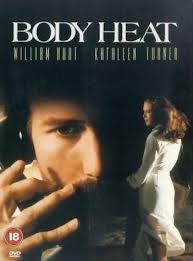
BODY HEAT
US, 1981, 108 minutes, Colour.
William Hurt, Kathleen Turner, Richard Crenna, Ted Danson, Mickey Rourke.
Directed by Lawrence Kasdan.
Body Heat made a great impression at the beginning of the 80s. It was a strong, adult, erotic drama with overtones of the thrillers written by such authors as Raymond Chandler and James Cain. It is very reminiscent of the 1944 film Double Indemnity with Barbara Stanwyck and Fred Mac Murray.
The film introduced two emerging actors at the time, Kathleen Turner and William Hurt. They were to go on to very strong careers, Hurt winning an Oscar for The Kiss of the Spiderwoman in 1985. They were reunited on screen in The Accidental Tourist. Both films were written and directed by Lawrence Kasdan.
Lawrence Kasdan was a successful writer (Raiders of the Lost Ark) but went on to direct several significant movies in the 1980s including The Big Chill and Silverado. He achieved commercial success with The Accidental Tourist. During the 90s, his career lapsed after he made a very long and rather criticised film of Wyatt Earp with Kevin Costner. He moved towards smaller-budget films in the late 90s and made the excellent film Mumford and then went on to direct the Stephen King adaptation The Dream Chasers.
Body Heat raises a lot of American morality issues. The nature of American marriage, its surface, its seething underneath. Fidelity and infidelity are also strong themes as well as vicious violence and murder for personal and financial benefit. It is well worth seeing.
1. An enjoyable film? A critically successful film? In the American thriller tradition? An exercise in transferring '40s crime film noir to the '80s? The directorial debut of the writer/director.
2. The American tradition of the film noir? A cynical view of life, unpleasant characters, criminal behaviour, amoral attitudes? Audience entertainment, identification, disgust? The ironies of criminal hero and heroine? The moral dilemmas presented? The crime, American setting, American traditions of justice? Conflict between Good and Evil? Greed, lust, power, shrewdness, deviousness, violence?
3. The film noir, crime, male-female relationships? Power, need, love, lust, greed? Passion and complementarity? Mutual using, manipulation, control? Responsibility and conscience? Justice, done, seen to be done?
4. The title and its atmosphere? Passion, the focus on the body? The visualising of the heatwave? The central characters and the external symbol of their inner experience? The comment about the heatwave and people breaking the law? The atmosphere of Florida, the city, the devices for the heatwave, sweat, the chimes? The colour photography and its evocation of mod and atmosphere? Day and night? The environment of the central characters, wealth, ordinary apartment? The detail of the film and the decor? Relating it to the central themes and passion? Editing and pace? The symbol of the web?
5. The musical score and its evocation of '40s scores for similar kinds of films?
6. The structure: the relationship to the work of James M. Cain and Raymond Chandler? The relationship to Double Indemnity? The introduction to Ned, his attitudes and behaviour, the heat, the destruction of the hotel? The encounter with Mattie, the visual and psychological playing with each other, the build-up of the bond leading to the decision to murder and carrying it out? The details of the plan and the execution? The beginning of the accidents, the change in attitudes of Ned and Mattie? Investigation, the discovery of Mattie's deviousness? Ned becoming the victim? New violence? The irony of Ned's discovery of the truth and the finale in Hawaii? The strength of the plot narrative, the gradual development of causality and interlinking of situation and characters, the gradual revelation of the manipulation adding to the layers of meaning?
7. Moral judgment on the characters, in terms of the law, moral standards? The audience attitude towards them, sympathy. revulsion? The need for justice and punishment?
8. Ned, the strength of William Hurt's presence and performance? The average lawyer, the glimpse of him conducting the case and his not managing it well? The seedy client? Symbol of what was to happen? His work in the past and his ignorance of aspects of the law? His friendship with Pete Lowenstein and their discussions together, Lowenstein's comment on Ned's past, on his attitude towards life, especially in his attitudes towards sexuality? Ned's office, his secretary? His mistakes and their being able to be manipulated by Mattie? His picking up women ? the sequences in his room: the girl and the burning down of the hotel, nurses? His reflection on his past being burnt in the hotel, a symbol of what he was to do for the future? The encounter with Mattie, his wandering the night during the heatwave, his searching for her, finding her, obsession and following her, the chimes, her asking him to leave, waiting behind the door and inviting him back in? Their passionate encounter? The motivation in the relationship - how much love, lust? (And the irony for the audience that it was all being controlled by Mattie?)
9. The visualising of the affair, the passionate sequences? Ned falling off with his work? The ironic encounter with Mary Ann in the gazebo and its relevance to the later developments? The episode with Heather and its being used? His drawing the conclusion about the need to murder Edmund? The secrecy of the affair, Ned's attention to detail, the irony of Mattie's greater attention to detail? The execution of the plan: the hotel, the ordering of the car, the discussions with Teddy Lewis about explosives, surveying the hotel basement? The cold-blooded attitude towards the crime, greed and lust ? and almost a fatalistic approach that this was the meaning of his life?
10. The irony of the meeting with Edmund? Accident? His invitation? Mattie rising to the situation? The friendliness, the edge for Ned? Talk, money, jobs? Edmund saying he would kill his wife's lover? His statement about his success by being able to 'do what was necessary'? Ned and his actually stating the truth, with humorous embarrassment? Mattie's coolness and her comment about feminine conversation? The build up to the night? Edmund in bed, taking his gun? The murder sequence? The effect on Ned, the car and the fog, the near-collisions on the highway? Setting the explosive? Mattie and the fog? The police passing by? His having covered everything but the irony of Mattie and her phone calls, concealing the glasses?
11. The effect of the murder on Ned? Separation from Mattie? The importance of the phone call from the lawyer and his non committal responses? Coping? The discovery of what Mattie had done about the will? The will reading? The pressures from Oscar and Pete for him not to go to Mattie and his coming out into the open and saying that he would? The investigation and its effect on him? Oscar and the search, gaining information? Oscar's interviewing him, searching his room? Pete's discussion with him on the wharf and the ironic symbol of his jogging and then smoking? The glasses, the phone calls from Mattie? His being trapped, going to the boat house, seeing the lead? The encounter with Mattie and the explosion? His grief for her and his arrest? Justice?
12. The significance of the overhead track in the prison cells and his waking from a dream to realise that Mattie was not dead? His anxious discussions with Oscar? The Year Book and the photo of Mattie, her identity, her ambition to be rich and live in exotic lands? His finally seeing everything clearly?
13. Mattie as the femme fatale? Audiences first seeing her through Ned's eyes? The heat, the concert, her provocative standing and walking, her striking white dress, her manner of walking, hair style? The accidental encounter? Her skill in easy talk with Ned? Leading him on, the heat, sexual innuendo, her marriage? The accident with the ice cream and her disappearing? Ned's finding her at the bar and her slapping his face? Her leading him homes? The chimes? Her asking him to leave and yet giving him the message to come back? The passionate nature of the affair? The encounter with Heather? Giving Mary Ann the money and talking about her going to Europe? Her encounters with Edmund and his treatment of her?
14. The glimpse of Edmund, background of his law work, changing to business, shady deals? Her relationship with him? His taking her for granted? The wealthy circles in which they moved? The restaurant sequence? His discussions with Ned? The ugliness of his death? His being the victim of his own principles? Pete Lowenstein's later comment about his personality and career?
15. Audience sympathies and shifting in regard to each character? Interest, justice? Expectations being set awry with the discovery of the truth about Mattie? Her grief, separation from Ned, continued professions of love and passion? The will reading and her control? Her phone calls and her absences? Her final arrival and the audience knowing the truth about her?
16. The sketch of Oscar and Pete? Representing law and justice? Oscar's commitment to his work, his investigation, friendship with Ned, warning him? Pete and his more offhand manner, ambitions? His mannerisms, dancing and movement, sex jokes and crude references? A genial friend towards Ned? Trying to warn him?
17. The background of the city, the lawyers going to the cafe, meals, heat, conversation, jokes? Their friendship with Stella at the cafe? Ned's secretary? The hotels, the court scene and the judge's attitude towards Ned and his seedy client?
18. Teddy Lewis and the prison sequences, his friendship with Ned, advising him how to construct the explosives? The importance of his warning to Ned about Mattie's enquiries? The irony of Ned's encounter with the lawyer and the discovery of the truth about Mattie and her information?
19. The film's attention to visual detail and symbol, the initial hotel fire and Ned's past burning and yet his future arriving with his own burning of the hotel? The eating and drinking sequences, smoking? (The smoking at the reading of the will and Pete just breathing the air)? The prison and the banging of the prison gate etc.?
20. Ros and Heather, visit to Mattie, the reading of the will, the smoking, the test for the identification of Ned?
21. The end and Mattie in Hawaii - achieving her ambition? Isolated and alone? The clarification of her motives? Ned's motives? Their coming together and control and manipulation?
22. The film as a satisfying thriller, character study, piece of Americana, study of amorality and immorality?
Published in Movie Reviews
Published in
Movie Reviews
Tagged under
Saturday, 18 September 2021 19:44
Body Rock
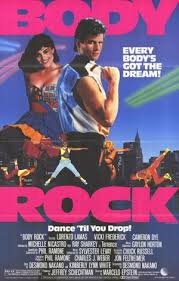
BODY ROCK
US, 1984, 93 minutes, Colour.
Lorenzo Lamas, Vicki Frederick, Ray Sharkey, Grace Zabriskie.
Directed by Marcelo Epstein.
Body Rock is a musical typical of 1984. With the popularity of break dancing and music, there were several films: Breakdance, Beat Street, Electric Boogaloo (Breakdance 2). This is one of the livelier examples and relies on the influence of such films as Fame and Flashdance.
Hero is played by Lorenzo Lamas (who appeared in Grease, Falcon Crest). He is something of a look-alike John Travolta with the same presence, strut and dancing (not as adept as Travolta). The film is full of lively dancing, much of it very elaborately staged. The plot is almost cliche, the talented group, the rise to the top, exploitation and disillusionment,. confrontation and happy ending.
Ray Sharkey, from The Idolmaker and Willie and Phil, plays a go-getting manager.
1. Entertainment value? Impact as a 1984 musical? The tradition of the American musical, break style?
2. Location photography, the atmosphere of the city? Poverty? The use of paint, graffiti? The elaborate technical staging of the music? The editing and pace? The special effects, especially colour and lighting?
3. The American musical and the influence of such films as Fame? The popularity of breakdancing and its music? The skills of the dancers, the mime, the body movement? Put in elaborate shows? The nightclub atmosphere, influence of nightclub acts with their presentation of men and women, the battle of the sexes, offbeat sexuality? The influence of video and video clips? How well presented?
4. The contribution of the score and its beat? The range of songs and their popularity? The lyrics and their being used as background for the plot?
5. The plausibility of the plot? The old American dream plot? The poor boy and the group, the lack of success, possibilities, push, the conman, the exploitation, the betrayal, the rise to the top and being spoilt, disillusionment, misunderstanding, the reconciliation, the happy ending? An '80s version of the American dream? How attractive, believable?
6. Lorenzo Lamas' presence, style, singing, dancing? An attractive romantic lead? His relationship with his mother? Friends? With his sister? The naivety? The conman? The friendships, the interviews for the job? His going to Terence and his spiel, exploiting the situation? Not wanting to opt out on his friends? Their persuading him to go and draw them in later? The interviews? The success? The relationship with Donald and Clare? His success in performance, the elaborate staging? Taking him to the gay club and his reaction to Donald's kiss? His being locked out, the recording session cancelled? His breaking with his friends? Wealth, the apartment, Clare? his sister seeing him? His confrontation of Terence? His wandering the streets, ousted? His clash with his girlfriend in the hospital? His decision to return to the club, his self assertion, taking over, the reconciliation, confrontation of Donald, of Clare and edging her off the stage? Making Terence turn on the music? The happy ending?
7. The group, the range of backgrounds, racial backgrounds, the melting pot of the American city? The collaboration in painting, in dance and music? The skill of the breakdancers? E-Z's reaction, final reconciliation? The talent of Magick? the young boy, the sequence of his skills on stage, with the basketball, the finale? His teaching Chilly breakdancing moves? Their final triumph?
8. The personalities of Donald - wealth, the gay club, power, putting up the money, his hold on Terence? Terence and his impersonal attitude, a conman, relationship with Chilly, helping him, shutting him out, the final confrontation?
9. The atmosphere of the streets? The atmosphere of the clubs? Show business?
10. Conventional American show business themes with 1980s verve?
Published in Movie Reviews
Published in
Movie Reviews
Tagged under
Saturday, 18 September 2021 19:44
Body Slam
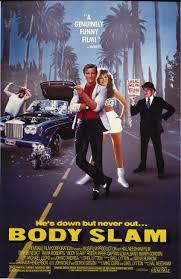
BODY SLAM
US, 1987, 100 minutes, Colour.
Roddy Piper, Dirk Benedict, Tanya Roberts.
Directed by Hal Needham.
Body Slam is an action comedy directed by Hal Needham (Smokey and the Bandit series, Hooper). It has a setting of advertising hustling, wrestling, rock and roll. And it would probably appeal to wrestling fans who have a tolerance of rock and roll. Dirk Benedict and Tanya Roberts star. Forgettable.
1. Film about advertising and promotion, wrestling, rock and roll? The combination?
2. California settings, on the American road? Society? The wrestling world? The rock and roll world? Staging of the musical numbers, staging of the wrestling? Musical score?
3. The title, the wrestling focus?
4. Harry as a hustler, his promotions, his self confidence, out of money, discussing with agents? Promoting of rock and roll and his contacts? Meeting the wrestler and his daughter, in contact with the wrestling world, the matches, the interviews, the injuries? Promoting the social and the clash with Candice? On the road, ingenuity? Double crosses? Clashes with Candice and falling in love? The little girl? Gradually sorting every thing out?
5. Candice and her mother, socialites, the entertainment, Harry's mistake, their continued clashes, falling in love?
6. The wrestlers, the wrestler and his daughter, their needs? Promotions, rivalries? The show business style of wrestling? The matches?
7. The rock and roll contacts, linking them with the wrestling, the personalities, the performances? The combination?
8. An action film for the widest possible audience?
Published in Movie Reviews
Published in
Movie Reviews
Tagged under
Saturday, 18 September 2021 19:44
Bodysnatcher, The
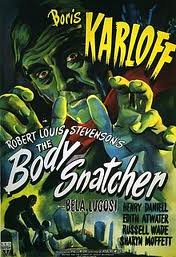
THE BODYSNATCHER
US, 1944, 85 minutes, Black and white.
Boris Karloff, Henry Daniell, Bela Lugosi.
Directed by Robert Wise.
The Bodysnatcher is a classic horror film of the 40's based on a Robert Louis Stevenson novel, re-creating an eerie Edinburgh and relying on its horror by understatement and atmosphere rather than shocks. In this it is most successful - as in the example of the sudden silence of the street-singer who, we realise, has been murdered by Gray.
Boris Karloff shows real acting talent in the sinister role of Gray and has to rely on few tricks to frighten audiences. Direction is by Robert Wise, later to make The Haunting (1963) and, of course, West Side Story and The Sound of Music.
1. A good thriller? Why? A good horror film? Why?
2. How was the eerie atmosphere of Edinburgh conveyed?
3. Did the film have an atmosphere of graves and death? What devices did the director use for this? How did he use darkness?
4. What were the roles of the street-singer and the horse in the film? What did they symbolise? How effectively were they used ? e.g., the little girl standing to see Gray's horse?
5. Was Mc Farlane a sinister figure? Why? Was he a good medical man? Why did he need the bodies? Did he have any right to take them? Were any of his arguments convincing or were they rationalisations?
6. Was the sub plot of the cure of the little girl well worked into the film? Why? Was it too sentimental?
7. Why did the hero follow Mc Farlane so easily? How did he cover his scruples about taking the bodies?
8. What was the role of John Gray in the film? What hold did he have over Mc Farlane? How did he use it? Did he enjoy it? Comment on his visits to the house, the scenes in the taverns, and his taunting of Mc Farlane.
9. How did Boris Karloff make Gray a sinister character? Did he use any melodramatic tricks or did he rely on a skilled characterisation?
10. Comment on the scene where he murders the street singer? In the dark the singing simply stops and yet the effect is horrifying. Are there other skilful examples of such subdued playing of horror?
11. What role did Joseph play in the film? His death?
12. Why did Mc Farlane not start afresh after his murder of Gray? Why was he so obsessed with his work and the need for bodies?
13. Were the haunting and retribution sequences effective? Why?
14. What choices did the hero have to make? What comment on medicine, humanitarian vision and the law did the film make?
15. How does this horror film compare with those of the 70's? Why?
Published in Movie Reviews
Published in
Movie Reviews
Tagged under